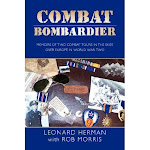A few weeks back, I initiated a feature called 'Ask a WWII Airman'. I invited readers to send in questions, and promised to get answers from my panel of WWII Air Corps veterans. Today, we have two questions, along with answers.
Question Number One: "Did the training you receive adequately prepare you for the experience of aerial combat, or, after your first experience with enemy fighters did you feel like you had been thrown into something that was impossible to prepare for?"
Maurice Rockett, who flew his tour with the 95th Bomb Group as a B-17 bombardier, responds:
Training did not prepare us for the realities of combat. There was no way, as I see it now, to put trainees into positions of death-defying situations. We did not even dream them up nor would instructors have any notion of what it would be all about either. It might have been helpful to spend longer flight periods at altitude with the poor equipment we had--speaking for my time, of course--and to fly with little rest.
As for fighters and flack, these elements had to be experienced personally for evaluation. Even then, many crewmen did not endure the hammering blows of the two mentioned perils. Regarding bailing out and the ensuing result of imprisonment would also be impossible to duplicate training experiences. Although, it would not have been impossible to give us jumping practice, but with the time constraints it was probably never even considered.
We just got shoved into impossible situations. as cannon fodder, without any guarantee of survival. Each person had to deal with death, or the possibility thereof, their own way with the hope luck would be on their side."
Dan Culler, who flew his tour with the 44th Bomb Group as a B-24 flight engineer/gunner, and ended up a POW in Switzerland, writes:
"We were always told you will get more training in your next assignment which ended up over Germany. I can't blame the military, they needed crews very bad and not that much time to train. As far as myself, the actual combat didn't bother me as much as my older crew. After all I was the youngest in our squadron. I guess that is why they want the very young to do the fighting. It doesn't bother you until later in life. I was kept busy jumping in and out of the top turret, trying to keep the dam plane flying, plus hand cranking the faulty turret. Poor Maurice in the nose saw everything coming at him. You know Maurice, I read later the people who made the top turret for B-24s admitted they had a failure problem on some turrets over 18,000 ft."
Question Number Two: "As you got further into your missions, did it get tougher to go on them or easier? Easier because you'd already been through the experience or tougher because you had fewer to go and had thus far been lucky?"
Maurice Rockett responds: "I really did not relate to missions like you do. I thought of a mission being tougher, not in anticipation, but as the result of what I encountered. While I did not fly a 'last' mission, one to finish my tour, the feeling or hope of survival would be paramount after so many hair-raising events in the skies over Europe."
Thanks for the questions, and thanks to Maurice and Dan for answering.
Anybody else have anything they'd like to know from these two living legends?
Subscribe to:
Post Comments (Atom)







No comments:
Post a Comment